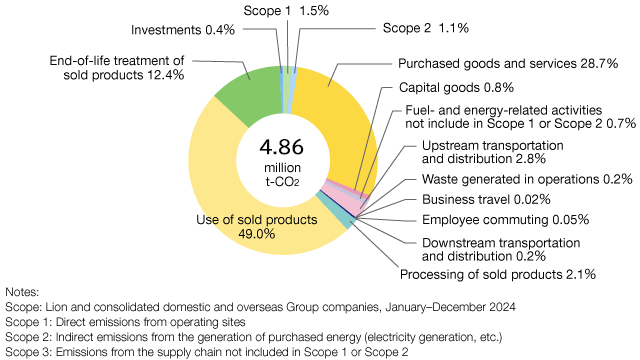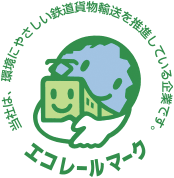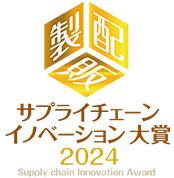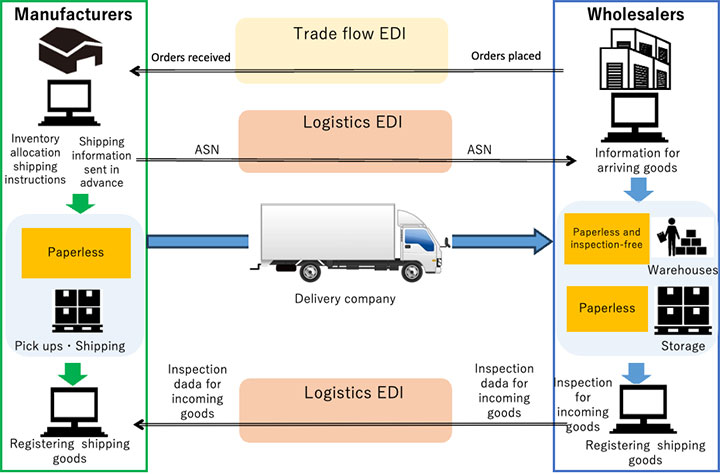The Lion Group recognizes that understanding greenhouse gas (GHG) emissions throughout the supply chain is important to realizing a decarbonized society. Accordingly, since 2013, we have calculated GHG emissions throughout the supply chain based on the GHG Protocol Scope 3 standard. In fiscal 2024 our Scope 1, 2 and 3 emissions totaled 4.86 million t-CO2.
Going forward, we will continue to promote and develop products that help reduce emissions during product use, a stage that accounts for a large portion of product life cycle GHG emissions. By doing so, we will work to reduce GHG emissions.
GHG Emissions throughout the Supply Chain (2024)

| 2020 | 2021 | 2022 | 2023 | 2024 | |
|---|---|---|---|---|---|
| Scope 1 | 19 | 21 | 21 | 20 | 19 |
| Scope 2 | 48 | 52 | 52 | 15 | 15 |
| Total | 67 | 74 | 73 | 35 | 34 |
| Carbon credits purchased | 0 | 0 | 0 | 0 | 0 |
Notes:
Scope 1: Direct emissions from operating sites
Scope 2: Indirect emissions from the generation of purchased energy (electricity generation, etc.)
| 2020 | 2021 | 2022 | 2023 | 2024 | |
|---|---|---|---|---|---|
| Scope 1 | 47 | 56 | 49 | 43 | 54 |
| Scope 2 | 42 | 22 | 36 | 38 | 38 |
| Total | 89 | 78 | 85 | 82 | 92 |
| Carbon credits purchased | 0 | 0 | 16 | 16 | 16 |
Notes:
Scope 1: Direct emissions from operating sites
Scope 2: Indirect emissions from the generation of purchased energy (electricity generation, etc.)
Lion works to reduce CO2 emissions and energy consumption intensity through the following efforts.
Lion’s overall modal shift rate in 2024 declined year on year. The modal shift rate for intra-company transport was 9.2% (compared with 9.3% in 2023).
Annual CO2 emissions from logistics came to 18,978 tons, down 13.8% year on year. Energy consumption intensity decreased 15.6% compared with the previous year, for a five-year average annual decreased of 4.2%, achieving of Lion’s target average annual reduction of 1% or more. We will continue efforts in these areas going forward.
The Eco Rail Mark system was created by the Ministry of Land, Infrastructure and Transport to certify companies and products that use rail freight transport for a certain portion of product shipment. Because distribution processes are typically opaque to consumers, the Eco Rail Mark is a useful means for companies to indicate that they use or their products are shipped using environmentally friendly rail freight transport.
Lion’s Eco Rail Mark certification was renewed in 2023. The certified Lion products are listed in the Eco Rail Mark pamphlet published by the Railway Freight Association and introduced on the website of the Ministry of Land, Infrastructure, Transport and Tourism.

The following four products are certified (as of June 2024).
As a response to such social issues as the logistics “2024 problem” and the need for sustainability, we have established a model case of multi-shipper mixed transport via shipping trailers using standardized transport modules. In contrast to the inefficiencies of the previous system, in which every company wishing to transport cargo had to do so independently, in this model, multiple companies coordinate schedules and cargo volumes so that shipments cannot only be consolidated but round-trip transportation using multiple shippers across industries can be achieved using large-size shipping trailers.
The overall effect of this initiative was a reduction of 31.2 tons of CO₂ per year (19.0% reduction), a reduction of 250 hours per year (15.4% reduction) in the number of driver hours, and a reduction of 39 vehicles per year (28.9% reduction).
As a result of these pioneering efforts, Lion and the other companies jointly received the top MLIT Minister’s Award for Green Logistics Partnership in the FY2024 Excellent Logistics Partnership Commendation Program for the third consecutive year.
To address the logistics “2024 problem,” the logistics efficiency of the entire household consumer product industry needs to be improved as there are limits to what can be achieved through individual company efforts. With the aim of achieving paperless, inspection-free, and efficient warehousing and shipping operations, we are implementing advance shipping information (ASN). In doing so, we are playing a leading role in the industry as a whole by proposing concepts and refining implementation models through participation in demonstration experiments within the Working Group for Standardization of Household Consumer Product Logistics. Thanks to the prior introduction of ASN transmission and shipping receipt-less systems and the strengthening of cooperation with a major wholesaler, we have been able to reduce outbound clerical work by 30% and inbound field work by 50%, resulting in an industry-leading model for supply chain optimization in the industry as a whole, particularly from the perspective of improving the labor environment and the SDGs. For this reason, Lion received the top prize at the Supply Chain Innovation Awards 2024, sponsored by the Ministry of Economy, Trade and Industry (METI) and the Manufacturing, Distribution, and Sales Cooperation Council.
* Electronic Data Interchange.

